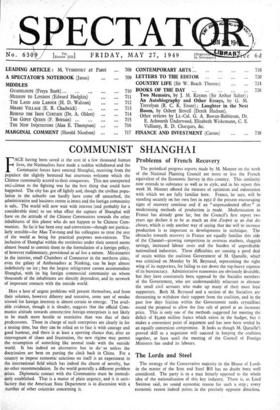Problems of French Recovery
The periodical progress reports made by M. Monnet on the work of the National Planning Council are more or less the French equivalent of the Economic Survey in this country. This similarity now extends to substance as well as to style, and in his report this week M. Monnet offered the mixture of optimism and exhortation with which we are fully familiar here. France, he says, will be standing securely on her own feet in 1952 if the present encouraging signs of recovery continue and if an " unprecedented effort " in modernising methods of production is made. Modernisation in France has already gone far, but the Council's first report two years ago declare it to be as much an etas d'esprit as an itat de! choses, which is only another way of saying that the will to increase production is as important as developments in technique. The obstacles towards recovery in France are equally familiar this side of the Channel—growing competition in overseas markets, sluggish savings, increased labour costs and the burden of unprofitable nationalised industries. These difficulties are causing a good deal of strain within the coalition Government of M. Queuille, which was criticised on Monday by M. Reynaud, representing the right wing of its supporters, for failing to cut down the top-heavy expense of its bureaucracy. Administrative economies are obviously desirable, but they have consistently been opposed by the Socialist members of the Government, who are understandably reluctant to alienate the small civil servants who make up many of their most loya: supporters. Both M. Reynaud and a section of the Socialists. are threatening to withdraw their support from the coalition, and in the past few days friction within the Government ranks crystallised round the proposal to allow the free sale of petrol at an increased price. This is only one of the methods suggested for meeting the deficit of 83,00o million francs which exists in the budget, but it makes a convenient point of argument and has now been settled by an equally convenient compromise. It looks as though M. Queuille's proved skill as a negotiator will succeed in keeping the coalition together, at least until the meeting of the Council of Foreign Ministers has ended its labours.






































